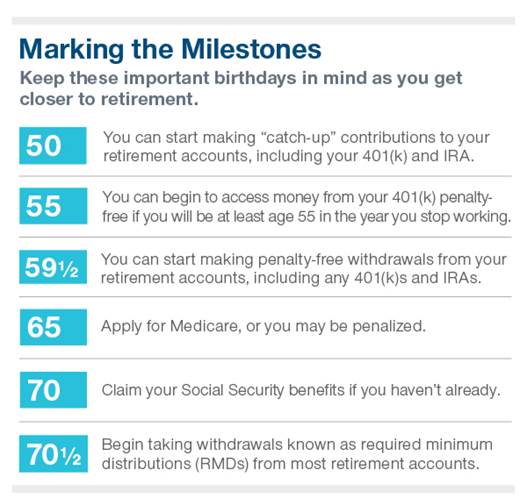6 Steps to Retiring Smart
Thinking about retirement within the next several years? Preparing for retirement requires some advance planning! You’ve worked hard to save for this milestone. It is important you take the necessary steps to ensure a comfortable financial future. This article by T. Rowe Price Insights, “6 Steps to Retiring Smart”, provides an insightful roadmap to help you navigate this unchartered territory you will come to enjoy!
Key Takeaways
✓ Track your spending carefully, and determine which expenses won’t continue into retirement.
✓ Be aware of important filing dates for Medicare and Social Security benefits.
✓ Know how you are going to draw down your investments, keeping tax consequences in mind.
The Pew Research Center estimates that 10,000 baby boomers are expected to turn age 65 each day from now until 2030. If you count yourself among this group—whether you plan on retiring next month or more than a decade down the road—consider these six recommendations to help you prepare for this next stage of your life:
1. Define your budget. It’s important to revisit and refine your spending assumptions as you get closer to retirement. Track your spending carefully, and identify which of your expenses will end once you stop working and which may increase in retirement. Focus on your basic living expenses first and then look to your discretionary items. This can help you match your income sources to your spending needs and show where you may have room for adjustments down the road.
2. Review your retirement accounts. You’ve focused on saving money throughout your career, but now you must decide how to handle those assets—including whether to keep all existing retirement accounts separate or to consolidate them into one account. Talk with your company’s benefits team to determine how to access the money in your retirement account—such as a 401(k)—after you retire. You may be able to leave the money in the plan and make periodic withdrawals, or you might need to roll those funds into an individual retirement account (IRA).
3. Decide where to live. Are you staying put in retirement or considering a move? Don’t assume you and your partner have the same plan in mind if you haven’t discussed it yet. As you develop your shared vision of retirement, consider whether you want to stay in your home, downsize, or relocate, and keep in mind how your home equity may factor into your retirement plans.
4. Create a Social Security strategy. You can start taking Social Security benefits at age 62, but waiting just a few years will allow you to claim your full benefits. For individuals born between 1947 and 1954, your full retirement age (FRA) is age 66. If you were born between 1955 and 1959, your FRA is between age 66 and 2 months and age 66 and 10 months, depending on your birth year. And for those born in 1960 and later, your FRA is age 67. No matter your FRA, the longer you wait—up to age 70—the higher your lifetime benefit may be. Consider coordinating your claiming strategy with your spouse. For instance, to maximize the benefit for a surviving spouse, the higher earner should wait as long as possible before claiming benefits.
5. Establish an income plan. Decide which accounts you will draw on first in retirement. Conventional wisdom suggests starting with taxable accounts to benefit from lower long-term capital gains rates. Then, access tax-deferred accounts (i.e., 401(k)s or IRAs), where distributions are taxed at ordinary income rates. Finally, tap in to your tax-free accounts (i.e., Roth IRAs, Roth 401(k)s) last. This order may vary depending on your situation; seek out the advice of a tax advisor if your situation is complicated.
6. Get to know Medicare. Medicare is the primary health program for retirees. You become Medicare-eligible at age 65 (regardless of your full retirement age, and exceptions may apply) but must enroll either three months before or up to three months after the month in which you turn age 65. Delaying enrollment may result in penalties. It’s important to understand and carefully evaluate your options to determine which plans are best suited for your situation. You can get an idea of the premium costs and out-of-pocket expenses on Medicare.gov. You may need to explore alternative health care coverage options, including the purchase of coverage through your state’s health care exchange, if you plan on retiring before age 65.
Preparing for and transitioning into retirement takes thoughtful preparation. You’ve worked hard to save for your post-career life, so take the time and effort now to help ensure a comfortable financial future.
This material has been prepared by T. Rowe Price for general and educational purposes only. This material does not provide fiduciary recommendations concerning investments, nor is it intended to serve as the primary basis for investment decision-making. T. Rowe Price, its affiliates, and its associates do not provide legal or tax advice. Any tax-related discussion contained in this material, including any attachments/links, is not intended or written to be used, and cannot be used, for the purpose of (i) avoiding any tax penalties or (ii) promoting, marketing, or recommending to any other party any transaction or matter addressed herein. Please consult your independent legal counsel and/or professional tax advisor regarding any legal or tax issues raised in this material.
Source: Original Article


